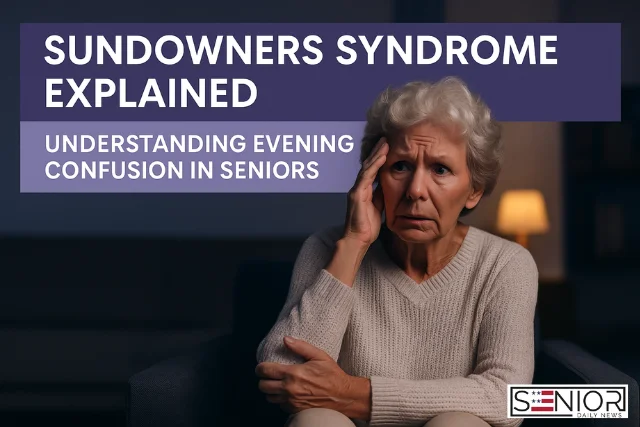Sundowners Syndrome Explained: Understanding Evening Confusion in Seniors

As the sun sets, some seniors may begin to act in ways that feel confusing or even alarming to their loved ones. They might become restless, anxious, or more forgetful than usual. This pattern, commonly known as Sundowners Syndrome, affects many older adults, especially those living with dementia or Alzheimer’s disease. While it can be challenging to witness and manage, understanding the condition is the first step toward supporting seniors through it with compassion and patience.
In this article, we’ll explore what Sundowners Syndrome is, its causes, common symptoms, and strategies to help manage it. Whether you’re a family caregiver or a senior experiencing it yourself, this guide will provide helpful insights and practical tips.
What Is Sundowners Syndrome?
Sundowners Syndrome, also called “sundowning,” refers to a state of increased confusion, agitation, or behavioral changes that occur in the late afternoon or evening. While it is not a disease in itself, Sundowners Syndrome is considered a symptom that often accompanies Alzheimer’s disease, dementia, or other cognitive conditions.
For many seniors, the quiet hours of dusk can bring on feelings of unease or disorientation. This shift typically peaks in the evening and may continue into the night, disrupting both the senior’s rest and the caregiver’s peace of mind.
Why Does Sundowners Syndrome Happen?
Researchers are still studying the exact causes of Sundowners Syndrome, but several factors appear to play a role:
- Internal clock disruption: Aging and dementia can affect the body’s circadian rhythm, making it harder to distinguish day from night.
- Fatigue: After a long day, tiredness can heighten confusion and frustration.
- Low light levels: Shadows and dim lighting at sunset can cause disorientation or fear.
- Unmet needs: Hunger, thirst, pain, or the need to use the bathroom can trigger agitation when a person has trouble expressing themselves.
- Medication side effects: Some prescriptions may wear off or increase side effects as the day progresses.
Understanding these triggers can help caregivers take steps to reduce the likelihood of sundowning episodes.
Recognizing the Symptoms of Sundowners Syndrome
Symptoms can vary from one senior to another, but common signs of Sundowners Syndrome include:
- Sudden confusion or disorientation in the evening
- Agitation, restlessness, or pacing
- Irritability or mood swings
- Increased anxiety or fearfulness
- Hallucinations or misinterpretations of shadows and sounds
- Trouble following directions or communicating
- Wandering or attempts to leave home
- Difficulty sleeping or staying calm at night
These behaviors often place emotional strain on families, but recognizing them as part of Sundowners Syndrome—rather than deliberate actions—can make caregiving less stressful.
Who Is at Risk?
Sundowners Syndrome most often affects seniors with Alzheimer’s disease or other types of dementia. However, it can also occur in older adults without a dementia diagnosis, especially if they are dealing with sleep disorders, vision loss, or other neurological issues.
Age itself increases risk, as the brain becomes more vulnerable to changes in sleep cycles and memory processing.
Coping Strategies for Sundowners Syndrome
Managing Sundowners Syndrome requires patience, observation, and a proactive approach. Here are some effective strategies:
1. Create a Calm Evening Environment
- Keep rooms well-lit to reduce shadows.
- Close curtains before dusk to minimize visual confusion.
- Play soft, soothing music or nature sounds.
2. Stick to a Consistent Routine
- Maintain regular meal and bedtimes.
- Avoid sudden schedule changes, which can worsen anxiety.
3. Encourage Daytime Activity
- Light exercise and fresh air during the day can improve sleep at night.
- Avoid long naps that may disrupt the sleep cycle.
4. Watch Diet and Hydration
- Serve a healthy dinner earlier in the evening.
- Limit caffeine, sugar, and alcohol, especially later in the day.
5. Communicate with Reassurance
- Use a calm, gentle tone.
- Offer simple explanations and avoid arguments.
- Stay physically present to provide comfort when needed.
6. Review Medications with a Doctor
- Ask if prescriptions may contribute to nighttime confusion.
- Adjusting dosage times or medications might help.
7. Seek Professional Help When Needed
- If symptoms worsen, consult a healthcare provider.
- Memory care specialists, support groups, and respite care services can also be valuable resources.
The Caregiver’s Role and Challenges
Caring for someone with Sundowners Syndrome can be emotionally draining. The stress of managing evening confusion often leads to caregiver fatigue and burnout. That’s why self-care is just as important as caregiving.
Strategies for caregivers include:
- Taking short breaks when possible.
- Seeking help from family, friends, or community services.
- Joining caregiver support groups for shared experiences and advice.
- Remembering that Sundowners Syndrome is a medical condition—not something you can fully control.
When to Seek Medical Advice
While Sundowners Syndrome is often linked to dementia, it’s important to rule out other causes. Seniors experiencing sudden confusion, severe agitation, or hallucinations should be evaluated by a doctor. Sometimes, infections (like urinary tract infections), medication interactions, or dehydration can mimic sundowning behaviors.
Early diagnosis and treatment of underlying health issues can improve quality of life for both seniors and caregivers.
Supporting Seniors with Compassion
Above all, supporting someone with Sundowners Syndrome requires empathy and patience. Try to step into their world rather than pulling them into yours. For example, if they believe it’s time to go to work—even though they retired years ago—respond with gentle reassurance rather than correction.
This compassionate approach often reduces agitation and helps maintain dignity, which is especially important for seniors navigating memory-related challenges.
FAQs About Sundowners Syndrome
1. Is Sundowners Syndrome the same as dementia?
No, Sundowners Syndrome is not a disease but rather a set of symptoms often seen in people with dementia or Alzheimer’s.
2. At what time does Sundowners Syndrome usually occur?
It typically happens in the late afternoon, evening, or nighttime, though the exact timing varies.
3. Can Sundowners Syndrome go away?
It doesn’t usually disappear, but symptoms may improve with routine, better lighting, and medical support.
4. How common is Sundowners Syndrome?
It is fairly common among seniors with dementia, affecting up to 20–45% of individuals with Alzheimer’s disease.
Image Source: Canva






